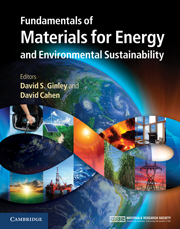Book contents
- Frontmatter
- Contents
- Contributors
- Preface
- Acknowledgments
- Part 1 Energy and the environment: the global landscape
- Part 2 Nonrenewable energy sources
- Part 3 Renewable energy sources
- Part 4 Transportation
- 31 Transportation: motor vehicles
- 32 Transportation: aviation
- 33 Transportation: shipping
- 34 Transportation: fully autonomous vehicles
- Part 5 Energy efficiency
- Part 6 Energy storage, high-penetration renewables, and grid stabilization
- Summary
- Appendix A Thermodynamics
- Appendix B Electrochemistry
- Appendix C Units
- Index
- References
32 - Transportation: aviation
from Part 4 - Transportation
Published online by Cambridge University Press: 05 June 2012
- Frontmatter
- Contents
- Contributors
- Preface
- Acknowledgments
- Part 1 Energy and the environment: the global landscape
- Part 2 Nonrenewable energy sources
- Part 3 Renewable energy sources
- Part 4 Transportation
- 31 Transportation: motor vehicles
- 32 Transportation: aviation
- 33 Transportation: shipping
- 34 Transportation: fully autonomous vehicles
- Part 5 Energy efficiency
- Part 6 Energy storage, high-penetration renewables, and grid stabilization
- Summary
- Appendix A Thermodynamics
- Appendix B Electrochemistry
- Appendix C Units
- Index
- References
Summary
Focus
The technology of flight provides immeasurable benefits for today's society: promoting global trade and commerce, providing humanitarian relief, and connecting people. In the next millennium, progressive environmental considerations will play a key role in our ability to continue to provide these benefits seamlessly. As with other transport, the consumption of petroleum-based fuels and materials draws from the Earth's finite natural resources. To move toward fully sustainable aviation, there must be a continued focus on reducing the environmental footprint over the product life cycle.
Synopsis
To ensure a balance between the social and economic benefits of aviation and the energy and environmental impacts, the aviation industry is working on improvements across the entire life cycle of its products and services. Opportunities for environmental improvement lie in advanced materials and manufacturing technologies, improved aerodynamics systems and engine efficiency, alternative fuels, increased fleet operational efficiency, and aircraft recycling.
- Type
- Chapter
- Information
- Publisher: Cambridge University PressPrint publication year: 2011

